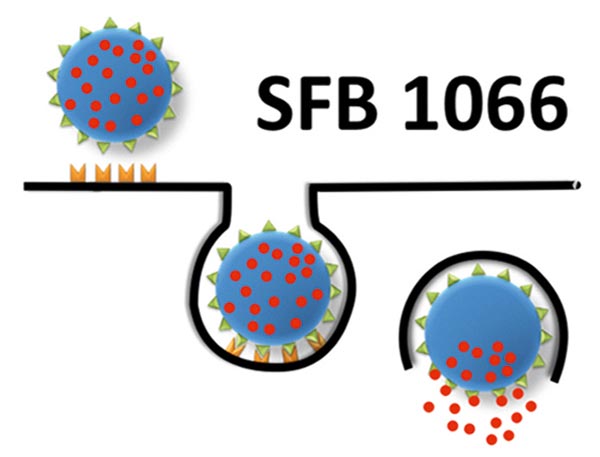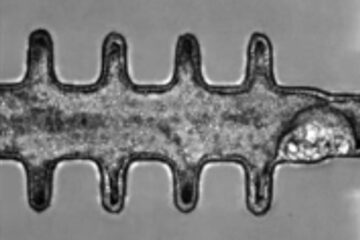Funding of Collaborative Research Center developing nanomaterials for cancer immunotherapy extended

CRC 1066 logo © CRC 1066
The German Research Foundation (DFG) has agreed to fund the Mainz-based Collaborative Research Center (CRC) 1066 “Nanodimensional Polymer Therapeutics for Tumor Therapy” involved in the development of nanomaterials for cancer immunotherapy for another four years to the end of June 2021.
This extension confirms Mainz as a major research hub in this field that requires input from both chemistry and biomedicine alike. Contributing to CRC 1066 are the Chemistry, Pharmaceutical Sciences, and Physics institutes at Johannes Gutenberg University Mainz (JGU) together with the Mainz University Medical Center and the Max Planck Institute for Polymer Research (MPI-P) in Mainz. The German Research Foundation will provide nearly EUR 13 million in financing over the next four years.
CRC 1066 is pursuing the development of new, multi-functional nanoparticle drug carriers that can be employed in the immunotherapy of malignant melanomas. “Chemists, biologists, and physicians work together extensively here in three complementary and thus closely integrated areas,” explained CRC Coordinator Professor Rudolf Zentel of the Institute of Organic Chemistry at Mainz University.
The objective is to use new nano-sized drug carriers to create targeted immune responses that can be used for treatment purposes. This can only be achieved by means of close interdisciplinary collaboration between polymer chemists, physical chemists, and (cancer) immunologists, i.e., three disciplines which traditionally have vastly different methodologies and scientific working methods.
“Over the past three years, we have managed to put in place an excellent foundation for our work on which we now mean to build. The main difficulty at first was learning to understand the various 'languages' used in the other scientific fields,” Professor Katharina Landfester, Director of the MPI-P, pointed out. Professor Stephan Grabbe of the Mainz University Medical Center added:
“Our findings are being published in internationally eminent journals and we are very proud of the fact that we have recently seen the first fruits of our research being employed for the purpose of clinical trials in patients.”
In the second funding period, the CRC will retain its current structure whereby it undertakes primarily polymer-chemical synthesis projects, translational-application oriented projects as well as analytical interdisciplinary projects.
At the same time, however, its focus will be more on the actual application of drug carriers created using polymer-chemical processes in biological systems rather than on the polymer synthesis method itself. The fully established collaboration between chemists and immunologists means that most individual projects can be jointly run by polymer chemists and immunologists.
The interdisciplinary nature of the CRC 1066 is reflected by the membership of its board. The board is composed of coordinator Professor Rudolf Zentel of Mainz University and the two vice coordinators Professor Stephan Grabbe of the Department of Dermatology of the Mainz University Medical Center and Professor Katharina Landfester of the Max Planck Institute for Polymer Research. Other members of the board are Professor Detlef Schuppan of the Department of Internal Medicine I of the Mainz University Medical Center and, as the representative for young researchers, Dr. Mathias Barz of the JGU Institute of Organic Chemistry.
Ill.:
http://www.uni-mainz.de/bilder_presse/09_orgchemie_sfb1066_II.jpg
CRC 1066 logo
© CRC 1066
Further information:
Professor Dr. Rudolf Zentel
Institute of Organic Chemistry
Johannes Gutenberg University Mainz (JGU)
55099 Mainz, GERMANY
phone +49 6131 39-20361
fax +49 6131 39-24778
e-mail: zentel@uni-mainz.de
http://www.ak-zentel.chemie.uni-mainz.de/eng/
Professor Dr. Stephan Grabbe
Department of Dermatology
Mainz University Medical Center
55131 Mainz, GERMANY
phone +49 6131 17-4412
e-mail: stephan.grabbe@unimedizin-mainz.de
http://www.hautklinik-mainz.de/dermatology/scientists/overview.html?L=1
Professor Dr. Katharina Landfester
Max Planck Institute for Polymer Research (MPI-P)
55128 Mainz, GERMANY
phone +49 6131 379-171
e-mail: landfester@mpip-mainz.mpg.de
http://www.mpip-mainz.mpg.de/physical_chem_of_polymers
Related links:
* http://www.crc1066.uni-mainz.de/ – Collaborative Research Center 1066: Nanodimensional polymer therapeutics for tumor therapy
* http://www.uni-mainz.de/presse/16451_ENG_HTML.php – press release “Johannes Gutenberg University Mainz obtains new Collaborative Research Center on 'Nanodimensional polymer therapeutics for tumor therapy'” (31 May 2013)
Media Contact
All latest news from the category: Life Sciences and Chemistry
Articles and reports from the Life Sciences and chemistry area deal with applied and basic research into modern biology, chemistry and human medicine.
Valuable information can be found on a range of life sciences fields including bacteriology, biochemistry, bionics, bioinformatics, biophysics, biotechnology, genetics, geobotany, human biology, marine biology, microbiology, molecular biology, cellular biology, zoology, bioinorganic chemistry, microchemistry and environmental chemistry.
Newest articles

Solving the riddle of the sphingolipids in coronary artery disease
Weill Cornell Medicine investigators have uncovered a way to unleash in blood vessels the protective effects of a type of fat-related molecule known as a sphingolipid, suggesting a promising new…

Rocks with the oldest evidence yet of Earth’s magnetic field
The 3.7 billion-year-old rocks may extend the magnetic field’s age by 200 million years. Geologists at MIT and Oxford University have uncovered ancient rocks in Greenland that bear the oldest…

Mini-colons revolutionize colorectal cancer research
As our battle against cancer rages on, the quest for more sophisticated and realistic models to study tumor development has never been more critical. Until now, research has relied on…





















